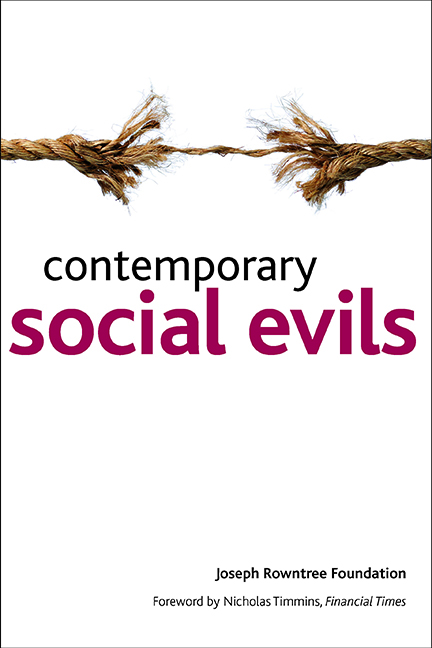Book contents
- Frontmatter
- Contents
- Foreword
- Acknowledgements
- Notes on contributors
- 1 Introduction
- 2 ‘Social evils’ and ‘social problems’ in Britain since 1904
- Section 1 Public Voices
- Section 2 Viewpoints
- A decline of values
- Distrust
- The absence of society
- Individualism
- Inequality
- Section 3 Reflections
- Appendix: How the ‘social evils’ consultations were organised
- Index
9 - Unkind, risk averse and untrusting: if this is today’s society, can we change it?
Published online by Cambridge University Press: 26 January 2022
- Frontmatter
- Contents
- Foreword
- Acknowledgements
- Notes on contributors
- 1 Introduction
- 2 ‘Social evils’ and ‘social problems’ in Britain since 1904
- Section 1 Public Voices
- Section 2 Viewpoints
- A decline of values
- Distrust
- The absence of society
- Individualism
- Inequality
- Section 3 Reflections
- Appendix: How the ‘social evils’ consultations were organised
- Index
Summary
There is a rabbinic saying that sums it all up:
If I am not for myself, who will be for me? And if I am only for myself, what am I? And if not now, when? (Mishnah, Ethics of the Fathers, 1: 14)
Broadly interpreted, the rabbis were saying:
“I have to look after myself, for I have to stand proud and know who and what I am. But if that's all I do, what kind of a human being am I? Selfish, uncaring and unkind. The world needs to be made into a better place and though I may not be able to do much, I can do a bit, and it's no good saying someone else can do it. The responsibility lies with me, and I cannot leave it till tomorrow.”
Selfish society
I have watched bemused as we seem to have become less and less caring for, or even aware of the suffering of, the most vulnerable in our society. This is not to say that there are not hundreds of thousands of people who carry out acts of kindness for those in trouble, day by day. Nor is it to say that we are bad people, or uncaring – although we may be insensitive to the needs of others, incompetent or somehow unaware in other ways. Nor is it to argue, as religious leaders have often done, that we have become selfish – although that may be partially true. I believe that something else is going on: a complex pattern of interactions of ideas, events, zeitgeist and personal human attitudes that has somehow allowed us to reach this position.
The idea that we have an obligation to society beyond the demands we wish to make of it ourselves is becoming unfashionable. Utilitarianism – the greatest happiness (or welfare or benefit) for the greatest number – is a philosophy now held in disrepute. Individual endeavour is adulated, as is personal autonomy. The old sense of mutual obligation, somewhat fostered by wartime, has taken a battering. We are into understanding ourselves and into self-improvement: improving our homes, our looks and our minds.
- Type
- Chapter
- Information
- Contemporary Social Evils , pp. 115 - 124Publisher: Bristol University PressPrint publication year: 2009



